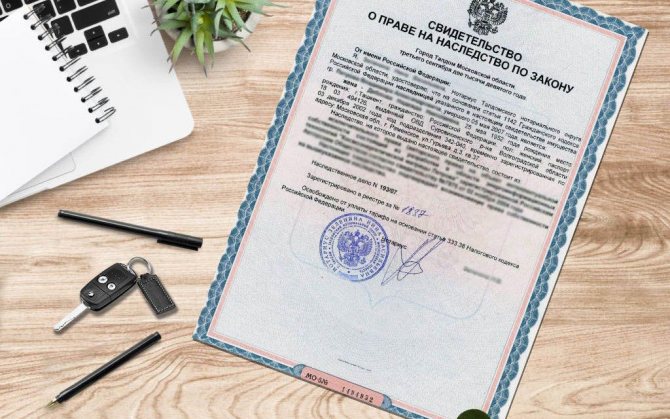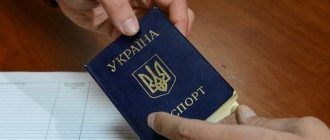Home » Inheritance » How to enter into an inheritance in another city
6
The territorial remoteness of the testator and his successors gives rise to the need to find ways to acquire the right to inheritance, allowing one to draw up documents without leaving the territory of one’s hometown. It is not recommended to delay contacting competent persons, since only 6 months are allotted for the acquisition of property, and if you miss the specified period, you can lose the benefits you are entitled to.
How to find out about inheritance in another city
To figure out how to enter into an inheritance from another city, you should familiarize yourself with the methods of informing successors. The notary who opened the inheritance case informs the citizen about the need to issue a certificate.
To learn more about the inheritance, you can contact the relatives of the deceased who live in the same city as the deceased. Also, in order to register an inheritance, it is allowed to send an official request to the notary office at the place of residence of the deceased.
Sample will
The contents of the will for the house and land consist of the following data:
- date and place of compilation;
- personal data of the compiler (full name, address, etc.);
- main text (the will of the testator, that is, to whom he transfers his property after death and in what quantities);
- instructions to clarify the contents of Art. 1149 of the Civil Code of the Russian Federation , which describes the right to an obligatory share in the inheritance;
- signature of the author of the document;
- instructions from the lawyer to verify the identity of the testator , as well as payment of the state duty, the presence of an entry in the register ;
- notary's signature and seal.
sample will for a house and land.
The notary is obliged to keep the contents of the will secret and not disclose it until the death of the applicant.
Inheritance procedure
To understand how to register an inheritance in another region, you need to study the general procedure for receiving the property of the deceased. First, you need to contact a notary office, draw up an application and attach the necessary documents to it.
The sequence of how to enter into an inheritance in another city:
- Visit a notary office in your locality. There you need to fill out an application, which is certified by a notary. Copies of documents confirming the right to claim the property of the deceased are also prepared and certified.
- Sending documents by mail or transferring them by an authorized person to the notary office at the place of residence of the deceased. In the first case, a person personally takes part in the inheritance procedure, therefore he is constantly in touch with other successors and the notary. If you act through an official representative, then it is enough to issue a power of attorney.
- Obtaining a certificate. The document is issued six months after the death of the testator.
If the deceased has executed a will, then this document must be provided to the notary. When there is no last expression of will, inheritance is carried out according to law and the successor must prove his relationship with the deceased.
Place of opening of inheritance
The inheritance case is registered at the last place of residence of the deceased. If the recipient of the property is located in another city, then he can claim the right to inheritance in three ways. When a person has not yet decided how to enter into an inheritance in another locality, it is recommended that you familiarize yourself with each option and choose the most convenient one for yourself.
Ways to claim rights to the property of the deceased:
- Go to another city . But not every citizen has the financial and time resources to travel and complete all the documents independently.
- Remote option . You can send the completed application and papers by registered mail. An unreliable option, because the package may get lost or arrive later than expected.
- Issue a power of attorney for a third party . The most optimal way that allows you to transfer all powers to a disinterested representative.
If the deceased lived abroad, then the inheritance case is opened at the location of his assets in Russia. A similar situation occurs when the last place of residence of the deceased is unknown. If the property is located in several cities, then the one in which the largest percentage of property is concentrated is selected.
Does region of residence matter?
Ideally, in order to register the rights to the property of the deceased, you need to visit the notary office at the place of his residence. But this option is often quite difficult to implement, since relatives may be in different parts of the country (for example, the deceased is registered in Moscow, and his successor lives in Siberia).
The region of residence does not matter if you fill out the application and prepare the papers correctly. Thus, documents can be certified at a notary office in your city, and then sent by mail. You can also entrust the preparation of all papers to a third party through a power of attorney.
When dividing an inheritance without a will, conflicts often arise, because each relative believes that he is entitled to a larger share than allotted by law. In this case, the heir is recommended to transfer his powers to a trusted person who will control the legality of all actions.
Package of documents
It is important for applicants to the property of the deceased to know not only how to apply for an inheritance, but also how to draw up additional paperwork. Their list may differ depending on the method of inheritance. But in any case, it is necessary to document the rights to inheritance.
List of required documents:
- certificate confirming the death of the testator;
- conclusion on the assessment of the value of the deceased’s property;
- papers confirming the deceased's ownership of assets;
- proof of relationship or will.
An exact list of documents can be obtained from a notary. To complete all the paperwork while living in another region, you need to include the necessary powers in the power of attorney. You can also hire a lawyer who will help you correctly draw up the documentation and send it by mail.
Expenses of heirs
If a citizen registers an inheritance, he must pay state tax. The amount of the fee depends on the degree of relationship with the deceased and the estimated value of the share.
The tax for persons of the first and second lines of kinship is 0.3% of the price of the received real estate, but not more than 100 thousand rubles. Distant relatives are required to give the state 0.6% of the estimated value of assets, but not more than 1 million rubles.
Deadlines for entering into inheritance
To register an inheritance, six months are allotted after the death of the testator. If a person died on 08/01/2019, then the last day for filing an application will be 02/02/2020. If the death of a citizen was established in court, then the countdown begins the next day after the decision was made.
When, after 6 months, someone abandoned the assets of the deceased or did not submit an application at all to issue a certificate, then another 3 months are allotted for the provision of documents by the heirs from the next queues. If a citizen missed the allotted period for a good reason, then he has the right to restore the terms through the court.
Scheme for registering a will
As mentioned above, the testator has the right to independently choose which notary to contact. However, it is advisable to choose an office according to the dream of residence or placement of the property being transferred.
The scheme for drawing up a will for a house and land consists of the following stages:
- Design of the text itself , which indicates the data of the testator and heir, and also describes the transferred property. It is also possible to place restrictions on the right of individuals to inherit property, even if it is legally theirs. In other words, the testator expresses his will in the text of the document.
- After the will has been drawn up, its contents need to be checked . These responsibilities are assigned to the specialist.
- Certification of a will.
The document is drawn up in two copies: the first remains with the author of the will, the second with the notary.
The scheme for drawing up and verifying an open will is described above. A closed form of document is drawn up without the participation of lawyers. The notary only participates in the certification of the document sealed in the envelope.
Where to apply for inheritance

First you need to determine where to send the application to formalize the inheritance. It must be submitted at the last place of residence of the deceased. This is usually the city in which the citizen spent the most time.
If the testator is a minor child or an incapacitated person, then the place of residence of the official guardians is taken into account. When a citizen is registered abroad, and his property is located in the Russian Federation, then the inheritance case is opened in the locality where the largest amount of real estate is located.
Visit to a notary
There are 2 ways of entering into inheritance - formal and actual. The second option allows you to dispose of the property of the deceased six months after his death. But for this you need to first obtain a special certificate. In this case, you will have to prove your rights to own property in a notary office or in court.
It is safer from a legal point of view to personally submit an application within 6 months after the death of the testator at his place of residence. A package of papers is also collected and submitted to the notary’s office. After six months, the notary issues a certificate.
When problems arise with a personal visit to a specialist (for example, when the heir is in another city), you can issue a power of attorney, according to which a third party will receive material benefits. It is also possible to send documents by mail.
Sending by mail
To send documents for an inheritance in another city by mail, you must first prepare and certify them with a local notary or authorized persons.
Which citizens have the right to certify applications:
- representatives of the municipality;
- embassy workers;
- heads of military units and prisons;
- representatives of the administration of social institutions and health organizations.
It is recommended to send papers in advance to meet deadlines. It is prohibited to impose conditions, correct information or provide false information in the application. You also need to complete and send the necessary papers. But if the documents are restored, then you can send one application. Specialists will accept all certificates later.
Transfer of powers to a third party
In Article No. 1153 of the Civil Code you can find a written clause according to which you are allowed to transfer your powers to a representative by issuing a power of attorney. The document describes in detail all the issues that will be dealt with by the third party.
What powers are allowed to be delegated to an official representative:
- checking the legality of the actions of other successors;
- filing an application;
- ensuring the safety of real estate and movable assets;
- cooperation with banks and other financial organizations;
- provision of missing certificates;
- making payments.
The official representative is a legally competent adult who is not interested in receiving the property of the deceased. It is best to contact a lawyer who knows how to properly prepare documents.
Actual acceptance of inheritance
Art. 1153 of the Civil Code of the Russian Federation provides for the opportunity for an heir to enter into an inheritance without visiting a notary. To do this, you need to actually take ownership.
That is, carry out one of the following actions with the property of the deceased:
- use as intended;
- carry out repairs;
- ensure safety;
- pay the bills.
Also, the actual acceptance of an inheritance is considered to be the payment of the debts of the deceased and the acceptance of debts from citizens who borrowed from the testator.
Upon actual acceptance, the heir does not need to visit a notary at all. Therefore, it is not necessary to go to another city.
Example. Ulyana learned about her grandmother's death. The girl kept in touch with her grandmother before her death, so she knew that her neighbor owed her a large sum of money. Ulyana called the debtor and asked to return at least part of the debt in order to organize the funeral. A neighbor transferred money to her bank account. The girl called the funeral company and organized the funeral remotely. Since Ulyana received a debt for the deceased, she is considered to have actually accepted the inheritance. The proof will be a bank account statement confirming the transfer of funds.
The disadvantage of this option is the impossibility of officially registering the property of the deceased. The heir will not be able to submit documents to register ownership rights to the traffic police, Rosreestr, or withdraw money from the deceased citizen’s account.
Thus, upon actual entry into inheritance, the successor will only be able to live in the apartment of the deceased, visit the dacha, and use the garage and household items for their intended purpose. He will not be able to sell or donate property. To do this, you will need to formally register ownership through a notary or through the court.
In addition, the actual entry into rights is fraught with the fact that other heirs may promptly contact a notary and formalize the inheritance. Then the successor, who actually took over the rights, will have to prove his case in court.
Are you tired of reading? We’ll tell you over the phone and answer your questions.
Rights to inheritance by law or by will

You can claim the property of the deceased on the basis of law or a will. The first option is considered the most common. The priority and share of each legal successor are determined by law and are spelled out in detail in Article No. 1141 of the Civil Code.
According to the law, close relatives can claim the inheritance. In the first line there are husband, wife, children, father, mother. Each successor receives an equal share of the total estate (the total property of the deceased). When the assets are classified as jointly owned, the widower or widow can count on 50% of the community property. At the same time, they can also formalize a legal share of the inheritance mass.
If first-degree relatives refused to enter into an inheritance in another city or place of residence of the deceased, then the property is divided between distant relatives. The second line of kinship includes brothers, sisters, grandparents.
The testator can independently determine the circle of persons and their shares in the inheritance mass if he draws up and certifies the expression of will in advance. You can make a will in another city or even in another country. The main thing is to certify him at his place of residence.
Features of inheritance by will
If the testator makes a will during his lifetime, he will be able to independently determine the claimants for his assets. The last declaration of will must be certified by a notary office to give it legal force.
What information is included in the will:
- information about the successors and the size of the shares that are due to each of them;
- conditions for inheriting assets after the death of the testator;
- list of citizens who are prohibited from claiming inheritance.
Many people are interested in whether it is possible to make a will in favor of friends or colleagues. When drawing up an order, a citizen can transfer his property to any persons, including people with whom there are no family ties. But a will cannot deprive relatives of their obligatory and spousal shares.
Time limits for entering into inheritance under a will
Successors are given 6 months to complete and submit their application. The countdown begins from the day the heirs are announced. This date is set by the notary, which is communicated to all applicants for the property of the deceased.
Features of a will
A will is a one-sided transaction. Unlike a sale and purchase, where each party takes an active part in signing the contract, this document is drawn up exclusively by the testator. Moreover, the heir himself may not be aware of the property due until the death of its owner.
The general provisions of the will are described in Art. 1118 Civil Code of the Russian Federation . According to paragraph 3 of this article, the will is drawn up personally by the testator and the document bears his signature.

The testator has the right to rewrite the document as many times as he wants ( Article 1130 of the Civil Code of the Russian Federation ). The last will has legal significance.
It is also noteworthy that separate wills can be drawn up for different types of property. For example, an apartment can be bequeathed to one relative, and a house and land plot can be bequeathed to another. However, these wills must not contradict each other.
Extension of deadlines

If the successor does not formalize the inheritance within six months after the death of the testator, then he loses the right to claim the property of the deceased. Such a decision can be challenged in court. The heir must have a valid reason that prevented him from issuing the certificate on time.
Grounds for renewal of inheritance rights:
- ignorance of the death of the testator and the share of property allocated by the deceased;
- stay in prison;
- health problems;
- long business trips;
- service in the armed forces.
The period for accepting an inheritance can be extended through a court procedure. The issue can be resolved peacefully if all successors give their written consent to the recalculation of shares. But this option is practically unrealistic, because few people will agree to voluntarily transfer their part of the property to a third party.
What to do if the inheritance deadline is missed?

The heir, being in another city, may not immediately find out about the death of his relative or have other obstacles to the timely registration of the inheritance. As a result, the deadline for filing the application is missed. Is there a way out in this situation?
It is possible to restore the deadline. There are two options for resolving this issue - out-of-court and judicial . In the first case, the heir turns to the other successors and asks for their consent to his participation in the inheritance. If they agree, a peace agreement is drawn up and presented to the notary. Based on this, the specialist extends the time for filing an application.
It is not always possible to find a common language with other heirs, so the issue of restoring the term is often decided in court. But the judicial body meets the successor halfway only if there is a good reason for missing the period of entry into inheritance rights.
Respectfulness is determined by the judge independently. It is important for the heir to prove that he could not take part in the registration of the inheritance in any way. The reason may be that the successor:
- I did not know about the death of a relative, since I had not communicated with him for a long time, or other heirs deliberately hid the fact of death.
- Was in serious condition in the hospital for a long time, for example due to a coma.
- He lost his memory, as a result of which he could not know that he had relatives.
- Was on a long business trip.
This list is not exhaustive; the court may accept other circumstances. The main thing is that they should not depend on the will of the heir and must be supported by evidence.
Who pays off the debts of the testator

According to Article No. 1175 of the Civil Code, successors receive not only the property of the deceased, but also his debts. Debts are distributed among the heirs in the same way as assets.
What obligations pass to successors:
- bank loans;
- debt against receipt to ordinary citizens;
- late payments for utilities;
- unpaid taxes;
- various fines and delays.
If during the life of the testator a loan is issued with guarantors, then after his death it is they who undertake to repay the loan. When the deceased independently paid for the loan, then after his death all obligations pass to the heirs.









